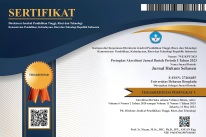Notary’s Responsibility For Deeds Signed Without The Presence Of Witneseses
Abstract
Notaries as Public Officials who have the authority to make authentic deeds should submit and comply with the applicable legal rules in the Notary Position Law (UUJN) and the Notary Code of Ethics. The existence of violations in procedures for making authentic deeds by Notaries shows the weakness of legal regulations in Indonesia in supervising the performance of Notaries' duties and positions. The legal consequences of this violation can affect the position of the authentic deed that is made. For this reason, the Government as central control should re-evaluate the rules for legal sanctions related to violations committed by these authorized officials. In this research the author examines 2 (two) problems, namely, what is the validity of a notary's deed signed without the presence of witnesses, and what is the responsibility of the notary for a deed signed without the presence of witnesses. This research is normative legal research, using the statutory approach, conceptual approach and historical approach. The research results show that the signing of a Notarial deed carried out without the presence of at least 2 (two) witnesses results in the deed being degraded to the strength of proof as a private deed. In this case, if the Notary is proven in court to have committed a violation, then he can be held responsible, whether responsible according to the Notary's code of ethics, civil or criminal.
Downloads
Copyright (c) 2024 Zakiah Noer, Abdul Basid

This work is licensed under a Creative Commons Attribution-ShareAlike 4.0 International License.






